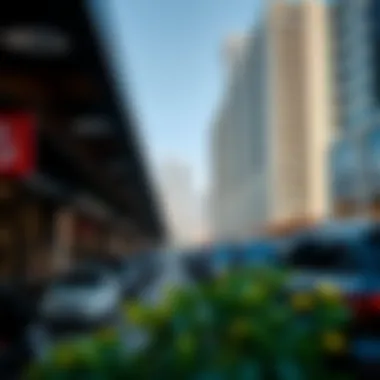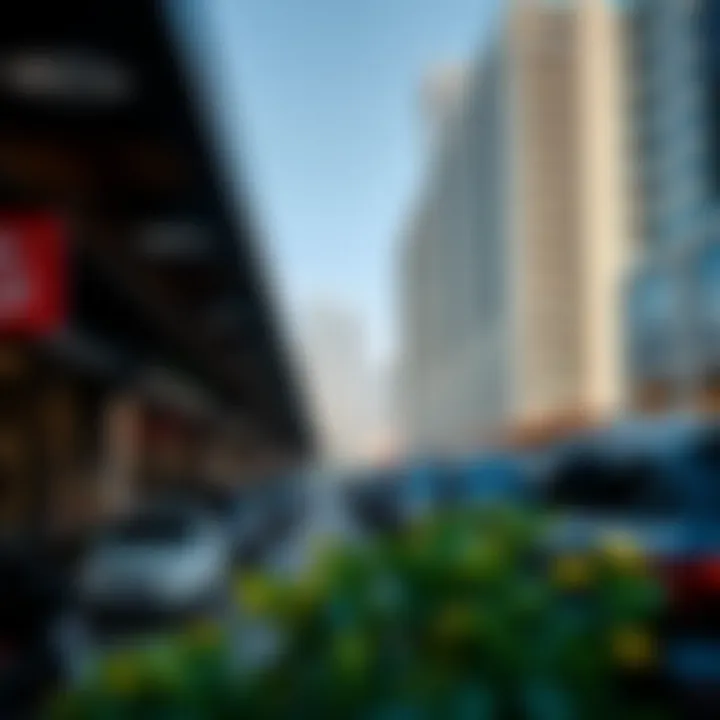Exploring Dubai's Free Parking Day: Impact and Insights


Intro
Dubai, a city synonymous with innovation and progress, has unveiled various initiatives to enhance urban life. Among these is the notable Free Parking Day, an event designed not just as a gesture of goodwill, but as a strategic move to invigorate the local economy and increase urban mobility. This practice isn’t simply about easing the burdens of parking fees for a day; it encapsulates a broader vision of fostering community spirit, sustaining local businesses, and advancing sustainable transport policies.
As this article unfolds, we will analyze the driving forces behind Free Parking Day, its effects on local businesses, and how it relates to Dubai's urban landscape. Moreover, we will look at its influence on the commuter experience and the long-term implications for city planning.
Through a detailed exploration, this piece aims to equip investors, buyers, and developers with insights they need in a city that is ever-evolving.
Market Insights
Current Trends
As the sun rises over Dubai's bustling streets, a wave of activity ensues, resembling an orchestrated dance among residents, expats, and tourists. Free Parking Day is part of a growing trend focused on city-wide participation and community-building initiatives. Shoppers flock to local markets, and diners fill up trending restaurants, all attracted by the appeal of free parking. Traffic flows more freely—it's a win-win for all parties involved.
With more people gravitating to local businesses, trends indicate a potential uptick in sales during Free Parking Day as foot traffic increases. Not surprisingly, shops often leverage such moments to promote sales or unique offers, creating a cycle of economic activity.
- Rise in Local Engagement: More events like this can catalyze similar initiatives aimed at boosting the local economy.
- Promotion of Sustainable Culture: This trend is aligned with Dubai’s broader commitment to sustainable urban living.
Price Analysis
Understanding the economic implications of Free Parking Day requires a look into price fluctuations in nearby businesses. When parking fees are waived, it’s not just about saving a few dirhams.
- Immediate Economic Benefits: On the day itself, local businesses often notice a significant spike in purchases.
- Long-term Investment Value: An increase in customer visits leads to a more vibrant economic community, thus enhancing the local property markets.
It’s clear from current data that Free Parking Day delivers a boost not only in foot traffic but potentially in residential and commercial property values. As a ripple effect, property investors must keep a keen eye on how these small shifts can lead to considerable gains over time.
"Free Parking Day not only eases the pockets of the everyday shopper; it stirs the economic pot of the whole locale, driving business where it was previously stagnant."
Investment Strategies
Buying vs. Renting
For those contemplating investing in Dubai’s real estate market, the added value of community initiatives like Free Parking Day cannot be overlooked in decision-making.
- Buying: Investors who acquire properties in bustling districts may find their endeavors rewarded through increased rents and property appreciation, particularly in areas benefiting from Free Parking Day.
- Renting: For expatriates and newcomers, the vibrant atmosphere created by such initiatives makes renting appealing, drawing in potential tenants looking for lively neighborhoods.
Financing Options
Navigating the financing landscape is pivotal for those looking to invest. With ongoing support from the Emirate for urban initiatives, there are advantageous financing options available. Many banks provide favorable mortgage solutions for investors. Researching these can save potential buyers significant money in the long run.
Also consider the added bonuses that could come from investing in areas where community events like Free Parking Day are more frequent. It’s all about equating investment with not just property but a lifestyle.
In summary, Free Parking Day is more than just a day without parking costs; it's embedded within a larger narrative of economic growth and urban revitalization, readying Dubai for a smart, sustainable future.
Preface to Free Parking Day
Overview of the Initiative
Dubai’s Free Parking Day stands as a significant initiative aimed at reshaping how residents and visitors perceive urban mobility and public space usage. This event is not merely about waiving parking fees; it signifies a concerted effort to enhance the overall experience of accessing urban areas, particularly for those who frequent shops, cafes, and cultural hubs. By allowing free parking for one day, the city seeks to alleviate some burdens on drivers, who often encounter high costs associated with parking. This initiative is an opportunity for local businesses to shine, providing them access to potential customers who might ordinarily think twice about visiting if it comes at a price.
The ambivalence surrounding parking regulations has been a stumbling block for Dubai’s urban development. Here, the Free Parking Day emerges as a proactive measure, addressing complaints about high parking fees while trying to stimulate a collective sense of community among people, especially as they indulge in shopping and dining. Additionally, Dubai's strategic position as a booming metropolis makes this initiative a crucial factor in attracting both tourists and expatriates, who are often keen on exploring the urban landscape without the worry of added costs.
Objectives of the Event
The primary goals of Free Parking Day can be summarized as follows:
- Enhancing Local Business Opportunities: The day is meticulously timed to coincide with shopping and leisure periods, allowing business owners to capitalize on increased foot traffic. Many local shops and dining establishments hope to attract new clientele who may make purchases or enjoy services they had not experienced before.
- Promoting Urban Accessibility: This initiative aims to make urban destinations more accessible to all. By removing parking fees for this specific day, the city is encouraging people to visit areas they might have otherwise shunned due to steep parking costs.
- Encouraging Community Engagement: In the spirit of fostering community bonds, residents are empowered to rediscover their city’s offerings. This initiative provides a forum for neighbors to come together, creating ties through shared experiences, as they explore cafés and boutiques that they may not typically frequent.
- Conducting Data Collection and Analysis: Local authorities have the opportunity to observe patterns in traffic during the Free Parking Day. This holds potential benefits for future urban planning and parking management strategies. By analyzing the influx of visitors or changes in traffic patterns, the city can glean valuable insights into the behavior of drivers and pedestrians alike.


“Free Parking Day serves as an experiment not just in urban policy, but in community building.”
The intersection of these objectives reveals that this initiative is not solely about parking. It reflects the broader ambitions of Dubai’s urban landscape transformation — to create a more livable, economically vibrant, and cohesive community where all individuals feel encouraged to partake in their city’s diverse tapestry.
Historical Context and Significance
Understanding the historical context of parking policies in Dubai provides a vital backdrop for interpreting the Free Parking Day initiative. The streets of Dubai have transformed dramatically over the past few decades, mirroring the city's rapid urbanization and economic growth. A pivotal part of this development includes the evolution of its parking regulations, which have tried to balance the demands of an increasingly mobile population with the challenges of urban congestion and environmental sustainability.
Evolution of Parking Policies in Dubai
Dubai's journey regarding parking policies can be traced back to the early days of its urban expansion when very few vehicles crowded the roads. Parking was primarily unregulated; however, as the city grew, the number of vehicles soared. By the early 2000s, the government recognized the need for structured parking systems. New policies were introduced which included paid parking zones and restrictions in high-traffic areas, aimed at reducing congestion.
The introduction of the Roads and Transport Authority (RTA) in 2005 marked a significant shift in how parking is managed. The RTA implemented smart parking solutions, including using technology to guide drivers to free spaces. This was a game-changer as it integrated modern technology with urban mobility needs.
On days like Free Parking Day, the public gets a taste of what it feels like not paying for parking, drawing attention to topics such as fair access to urban spaces. The evolution of these policies highlights the balance between promoting local businesses and managing traffic effectively. It also opens avenues for discussions about how free parking can contribute to sustainable urban growth and community building.
In a city where the average car ownership rate can reach as high as 50%, the policies not only assist commuters but are also aimed at preserving the integrity of urban spaces for residents. Free Parking Day is thus a reflection of where parking policy stands now and a glimpse of potential future developments.
Comparative Examples from Other Cities
Looking beyond Dubai, several other cities have experimented with similar initiatives that may serve as valuable reference points. For instance, San Francisco has seen the implementation of Free Parking Days aimed at revitalizing local neighborhoods. They found that during these events, businesses noted a significant uptick in customer visits, suggesting that alleviating parking costs can encourage spending at local shops.
Paris also offers a contrasting model, where days of free parking are strategically used to promote urban cycling and public transit options. On those days, leaving the car at home is encouraged, paving the way for a dialogue about sustainable transport solutions. This pivot not only benefits local retailers but also underscores the city's commitment to reducing carbon emissions and improving air quality.
Here are some key points from various cities:
- San Francisco: Free parking days boost local business sales.
- Paris: Encouraging cycling and public transport reduces emissions.
- Amsterdam: Initiatives focus on converting parking spaces into parks on weekends.
These examples underline the importance of strategically designed parking policies. As Dubai navigates its unique challenges, insights from other cities can inform their own strategies, especially concerning sustainability and community engagement.
By understanding these historical contexts and learning from global examples, stakeholders can better appreciate the complexities and implications of the Free Parking Day. This initiative feeds into larger conversations about urban planning, economic vitality, and the community’s relationship with public spaces.
Economic Impacts of Free Parking Day
The economic ramifications of the Free Parking Day in Dubai are numerous and multifaceted. This event does not merely offer drivers a reprieve from parking fees; it also serves as a catalyst for local commerce, strengthening community bonds, and highlighting the intricate balance between urban development and resident needs.
Impact on Local Businesses
One noticeable effect of Free Parking Day is its immediate boon to local businesses. When parking costs are stripped away, foot traffic increases dramatically. Shoppers, often deterred by parking fees, find themselves drawn back into retail districts, eager to explore shops, cafes, and service providers. "It’s like throwing out a bait," one local shop owner mentioned, "people are just more willing to venture out when they know they can park for free."
The uplift can be particularly pronounced in areas that are inundated with competition. Businesses can implement promotions or events to draw in crowds, making them not just participants in the event but beneficiaries of the increased activity. For example, a local coffee shop might offer a "buy one, get one free" promotion or an apparel store could host a flash sale, potentially leading to a significant uptick in sales.
"Free parking acts like a magnet for curious shoppers who might have otherwise stayed in their homes. It gives the local economy a much-needed shot in the arm—just what we need!"
Additionally, restaurants see a surge in patrons as individuals are more likely to dine out when the cost of parking is no longer a consideration. Moreover, this increase in patronage can lead to job creation, as businesses may hire additional staff to manage the higher volume of customers. The ripple effect on the local economy, particularly for small business owners, cannot be understated.
Potential Benefits for Residents
Residents of Dubai stand to gain significantly from the initiative as well. Free Parking Day not only alleviates the financial burden on families but also enhances their quality of life. For many, parking fees can become a daily nuisance, subtly throttling any desires to venture out for simple tasks like shopping or eating at a local restaurant.
This day allows residents to feel a sense of belonging in their city. They can engage in community activities without the looming consideration of additional expenses. It fosters an environment where families can come together, enjoy recreational activities, or even participate in events that are hosted within their locales.
Moreover, the absence of parking fees can encourage social interaction. Neighbors might gather for informal meet-ups as they both find convenient spots without worrying about the clock ticking on an expensive meter.
In summary, the economic impacts of Free Parking Day sway beneficially for both local businesses and residents. As strategies for parking are reevaluated continuously, events like these could pave the way towards a more communal and economically vibrant urban environment in Dubai.
Environmental Considerations


The Environmental Considerations surrounding Dubai's Free Parking Day are pivotal to discuss, especially in light of the city's significant urban growth and the pressing challenges of sustainability that accompany such rapid expansion. This initiative aims not only to attract shoppers and promote local businesses but also to address broader environmental impacts directly linked to parking policies and vehicle usage in the bustling cityscape.
Assessing Traffic Patterns
One immediate effect of Free Parking Day is the potential alteration of traffic patterns throughout Dubai. Typically, when parking fees are lifted, many residents and visitors flock to the areas where parking becomes available, leading to changes in traffic flow. Increased vehicular presence can exacerbate congestion, particularly in high-traffic zones, such as downtown Dubai. A study of similar initiatives in other metropolitan areas indicates that while the demand for parking might surge, the resultant surge in traffic can raise air pollution levels, temporarily overshadowing the intention behind such events.
However, it also provides a unique opportunity to gather data on how traffic behaves under varied parking regulations. For instance, local authorities might observe which areas experience the most significant influx of vehicles and adapt future transportation strategies accordingly, like shifting to more sustainable options or enhancing public transport routes to circumvent traffic bottlenecks.
Moreover, the implementation of data collection mechanisms on this day could lead to informed policy-making. For instance, ways to improve traffic dispersal through changing traffic light patterns or modifying bus routes can significantly alleviate stress on crowded streets. Monitoring real-time traffic data allows authorities to adapt dynamically and find balance between promoting accessibility and ensuring efficient flow of vehicles.
Green Initiatives in Urban Planning
The concept of Free Parking Day also dovetails into Dubai's broader green initiatives and urban planning strategies. As the city grapples with its ambitious goals regarding sustainability — including its commitment to the Paris Agreement and efforts to reduce greenhouse gas emissions — such events can highlight the necessity for more environmentally considerate urban schemes.
The day serves as a reminder for local authorities to promote the integration of eco-friendly practices into urban development. Ideas such as expanding green spaces, implementing more bike lanes, and prioritizing public transport options become ever more relevant in discussions of community mobility.
For example, when parking becomes more accessible, authorities might advocate for the use of electric vehicles by offering charging stations in high-demand areas. Incorporating solar panels into parking structures or creating more shaded areas using local flora could reduce heat islands, making the urban landscape not just pedestrian-friendly but also pleasant for residents.
Furthermore, the lessons learned from observing traffic and parking behaviors during Free Parking Day can fuel future proposals aimed at enhancing public transportation initiatives, such as introducing more efficient bus services or even increasing the coverage of tram lines.
Local officials have emphasized that events like Free Parking Day should catalyze the conversation surrounding the urgency for integrated transport solutions that complement growing urbanization and concerns about sustainability.
Through thoughtful exploration of initiatives like Free Parking Day, stakeholders can gain a nuanced understanding of urban mobility trends, helping steer Dubai towards a future that responsibly balances economic growth with environmental stewardship.
Commuter Experience on Free Parking Day
In the bustling streets of Dubai, the Free Parking Day initiative holds a significant role in shaping the commuter experience. This one day set aside for complimentary parking is not merely a promotional tactic; it's a strategic move designed to enhance accessibility and streamline interactions for those traveling within the city. By examining this event closely, we can unearth layers of benefits, considerations, and overall implications that resonate with both visitors and residents alike.
Accessibility and Convenience
One of the most apparent advantages of Free Parking Day in Dubai is the unmatched accessibility it offers. On this designated day, drivers can park freely without having to worry about fees, which can often act as a deterrent for spontaneous trips. The ease of finding a parking spot enables commuters to visit local businesses, markets, and attractions with a renewed vigor.
For instance, a shopper looking to explore the vibrant souks might think twice about heading out if parking fees are steep. With the waiver of charges, the decision to hit the town becomes a no-brainer. This enhances foot traffic to various shops and eateries, providing a much-needed lifeline to local enterprises struggling to draw customers in an increasingly digital shopping landscape.
This gesture reflects an understanding that access should be simplified, making it easier for families, professionals, and tourists to navigate Dubai’s hotspots. Furthermore, it encourages community engagement— when people know they can park for free, they are far more likely to explore new areas and support local businesses.
Public Transport Interactions
The day also opens avenues for an improved synergy between private vehicle use and public transport. As parking spots become more readily available, commuters might choose to drive part of their journey before switching to public transport, further curtailing congestion in heavily trafficked areas. This dynamic can ease the burden on public transport systems, enabling them to allocate resources more efficiently.
For instance, consider commuters who typically rely solely on buses due to parking challenges. Free Parking Day might incentivize them to drive partway, allowing them to utilize the metro system for the last leg of their journey. This intermodal transit experience not only enhances the convenience factor but also encourages a culture of adaptive commuting—an essential trait for urban environments like Dubai.
In summary, the commuter experience on Free Parking Day in Dubai sheds light on the balance between convenience and planning. The initiative fosters accessibility, invigorates the local economy, and encourages a thoughtful interaction between various modes of transport. These aspects are especially valuable when talking about the future of urban mobility in a sprawling city known for its bustling lifestyle.
Remember, ease of access is a small change that can lead to significant impacts on urban living.
As stakeholders in the real estate, investment, and public policy sectors examine the implications of these initiatives, they are also looking at how such small changes can catalyze larger urban trends and foster sustainable economic growth.
Government and Policy Perspectives
Understanding the perspectives of government and policy regarding Dubai’s Free Parking Day provides significant insights into its operational framework and its broader implications. Local authorities play a crucial role in shaping urban transport initiatives, aimed not only at addressing current challenges but also at planning for the future.
Role of Local Authorities
Local authorities, particularly the Dubai Roads and Transport Authority (RTA), are the backbone of urban mobilitiy policies in the city. Their involvement in Free Parking Day is multifaceted; they are responsible for planning, executing, and evaluating such initiatives. The role of these authorities extends beyond managing logistics. They gather critical data that informs future parking policies and infrastructure needs by assessing how the free parking initiative impacts traffic patterns, commuting behaviors, and local business foot traffic.
The initiative presents a golden opportunity for them to demonstrate adaptability in an ever-changing urban landscape. Here are some key considerations:
- Traffic Management: Monitoring and analyzing traffic congestion levels on Free Parking Day helps authorities plan future events more effectively.
- Public Engagement: Initiatives like these can gather public response, allowing local authorities to understand community needs better.
- Innovation in Urban Policy: Free Parking Day serves as a testing ground for innovative policies that can help balance economic growth with sustainable transport.


Future Policy Directions
The future of parking policies in Dubai must be informed by the insights gained from events like Free Parking Day. As urban mobility continues to evolve, policymakers will need to incorporate technology and data-driven decisions into their frameworks. Automated systems could streamline parking management, and incentivizing shared mobility solutions could relieve congestion pressures.
The move towards smart cities means that local authorities must stay ahead of the curve, and here are a few potential directions:
- Data Utilization: Future policies may rely heavily on data collection to monitor trends and adapt regulations accordingly.
- Sustainability Focus: Emphasis on environmentally friendly transport solutions such as electric vehicle charging stations could integrate with upcoming policies.
- Integrated Mobility Solutions: Policies may evolve to integrate various transport methods, making it easier for residents and visitors to navigate the city seamlessly.
Challenges Associated with Free Parking Day
The engaging concept of Free Parking Day in Dubai is not without its hurdles. While the initiative aims to boost local business and attract more visitors, it can lead to significant challenges that urban planners, local authorities, and businesses must navigate. Understanding these obstacles is essential for stakeholders who wish to maximize the benefits of such initiatives while minimizing potential drawbacks. Here’s a close look at two major challenges that emerge from this day of free parking.
Potential for Increased Traffic Congestion
One of the most pressing concerns during Free Parking Day is the likelihood of increased traffic congestion throughout the city. When parking fees are stripped away, the allure of an open parking space becomes a magnet for drivers. This sudden influx often results in roads that are packed to the gills, turning normally smooth-sailing traffic into a crawl.
- The Ripple Effect: The congestion does not only persist on major thoroughfares but trickles down into residential areas and streets that usually see a modest amount of traffic.
- Time Wasted: For everyday commuters and those rushing to appointments, this can mean increased travel times, causing ripples in productivity that may extend well beyond the event itself.
- Fragmentation of Public Transport: As people opt for their cars over public transport, systems like the Dubai Metro might see reduced footfall, negatively impacting their scheduling and financial viability.
Given the interconnectedness of urban transit systems, local businesses must grapple with not just the short-term traffic issues but also how these congested roadways could deter customers in the future.
Regulatory Framework Issues
Another pivotal challenge faced during Free Parking Day is navigating the existing regulatory framework. While the intention behind the event might be noble, the implementation can often bump against established laws and safety regulations.
- Lack of Clear Guidelines: The absence of clear guidelines for maneuvering traffic management and safety can lead to confusion among drivers. When regulations are ambiguous, it paves the way for improper parking and disruptive vehicular behavior.
- Protection of Pedestrian Spaces: Business owners and local authorities must ensure that pedestrian walkways do not get encroached upon. Failure to manage this can deter foot traffic, which is often the lifeblood for local businesses.
- Environmental Regulations: Short-term free parking poses another layer of challenge when linked to environmental scrutiny. With an uptick in car usage, there might be concerns raised over potential air quality deterioration, compelling local governance and business leaders to ensure compliance with environmental standards.
In summary, while Free Parking Day promises various benefits, it also introduces significant challenges that require careful planning and responsiveness from all stakeholders involved. Addressing these hurdles can help refine future initiatives, making them more efficient and beneficial for Dubai's dynamic urban landscape.
Future of Parking Policies in Dubai
Trends in Urban Mobility
As Dubai continues to expand and evolve, the trends in urban mobility are crucial to framing the conversation around parking policies in the city. Increasingly, the focus has shifted towards sustainable transportation solutions that alleviate congestion and promote a greener environment. With more residents and visitors pouring into the city each year, the demand for efficient public transport is also on the rise.
One notable trend is the rise in ride-sharing apps like Careem and Uber. They are giving traditional taxi services a run for their money and changing the way people commute. Alongside this, the growth of electric vehicles is prompting the development of charging infrastructures, highlighting an increasing need for amenities catered to newer technologies. Moreover, smart city initiatives are making their way into the public transport landscape. Buses integrated with real-time tracking technology, for instance, can significantly enhance commuter convenience, naturally necessitating a rethink of existing parking policies.
Dubai aims to diversify its transportation options with the introduction of bicycle-sharing systems and pedestrian-friendly areas. These initiatives encourage alternative methods of transport while reducing the amount of space allocated to parking. Such a blend of solutions indicates a shift from prioritizing vehicle ownership to fostering accessible and multimodal transport networks.
Innovative Solutions for Parking Management
Dubai’s future parking policies aren’t simply about allocating spare lots; they require innovative management solutions that reflect modern realities. One approach that's gaining traction is the implementation of smart parking technology. Utilizing mobile apps that guide drivers to available spots based on real-time data can significantly cut down on traffic caused by drivers circling the block in search of parking. Furthermore, integrating systems that allow for automated payment can minimize congestion at parking facilities.
Another exciting avenue is the use of dynamic pricing models. Instead of fixed rates, prices could adjust depending on demand and peak times. This would encourage drivers to park during non-peak hours, helping to distribute traffic more evenly throughout the day.
An interesting concept that is also being explored is the idea of multi-use spaces. For example, existing parking lots could be designed to serve dual purposes. During weekdays, it could operate as a commercial parking area, while transitioning to a market space or community gathering area on weekends. This not only maximizes the utility of space but also fosters community engagement.
Ultimately, the future of parking policies in Dubai lies in adaptability and responsiveness to the needs of its growing population. As urban mobility trends continue to evolve, so too must the strategies in place to manage parking effectively, ensuring that both short-term and long-term needs are met while enhancing the quality of life for residents and visitors alike.
Culmination
In reviewing the implications of Dubai's Free Parking Day, it becomes clear that this initiative stretches far beyond the simple act of providing free parking. It serves as a catalyst for broader social and economic dynamics within the cityscape. By examining the various aspects of this event, we can draw out several critical insights that carry weight not only for local stakeholders but also for the overall advancement of urban mobility and public engagement.
Summary of Key Insights
The findings from our exploration underline a few pivotal points regarding the Free Parking Day initiative:
- Encouragement for Local Businesses: Free access to parking can lead to a spike in foot traffic for stores and eateries, effectively giving local shops more visibility and potential sales.
- Commuter Behavior Shift: On this day, there’s a noticeable change in how residents and visitors engage with urban spaces, promoting a higher utilization of the city’s various amenities.
- Environmental Considerations: Though there can be a short-term uptick in traffic, the long-term benefits of encouraging carpooling or using public transport on alternate days can be substantial, potentially leading to reduced carbon emissions in the long run.
- Government and Policy Reinforcement: The event can play a role in shaping future urban policies by analyzing traffic patterns and public response growing from this initiative.
These facets collectively present a layered view of how free parking can function as more than just a convenient measure; they reveal its potential to reshape economic landscapes and commuter habits.
Implications for Stakeholders
For various stakeholders — investors, developers, and policy-makers — understanding the implications of Free Parking Day is essential:
- Real Estate Investors: The increased foot traffic can drive up the property value of commercial real estate, making investment during or following the event potentially lucrative.
- Local Business Owners: The short-term benefits may encourage more businesses to participate in community events, fostering a sense of collective growth.
- Urban Planners: The data collected from such days can inform future infrastructure decisions, highlighting the need for more support in areas experiencing significant engagement.
- Residents and Expatriates: Awareness of such initiatives can encourage a sense of community engagement, urging residents to participate in local events or even voice opinions on urban policy further.
- Government Entities: Recognizing public response can help tailor more effective transportation policies that encompass the needs of all stakeholders involved.







